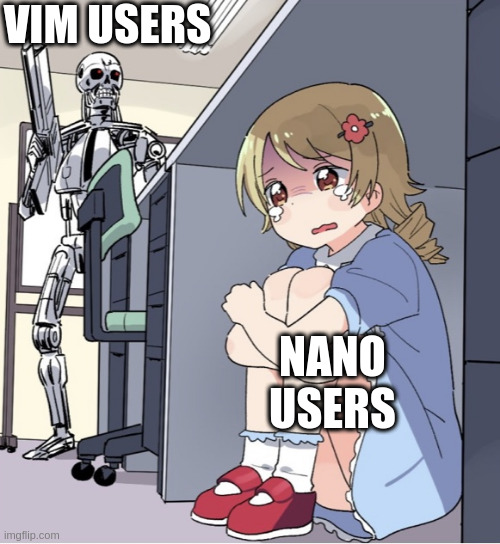I like nano tho it has some strange shortcuts
Linux
From Wikipedia, the free encyclopedia
Linux is a family of open source Unix-like operating systems based on the Linux kernel, an operating system kernel first released on September 17, 1991 by Linus Torvalds. Linux is typically packaged in a Linux distribution (or distro for short).
Distributions include the Linux kernel and supporting system software and libraries, many of which are provided by the GNU Project. Many Linux distributions use the word "Linux" in their name, but the Free Software Foundation uses the name GNU/Linux to emphasize the importance of GNU software, causing some controversy.
Rules
- Posts must be relevant to operating systems running the Linux kernel. GNU/Linux or otherwise.
- No misinformation
- No NSFW content
- No hate speech, bigotry, etc
Related Communities
Community icon by Alpár-Etele Méder, licensed under CC BY 3.0
micro has some improvements and default shortcuts that are much closer to common GUI text editors
Nano isn't even that simple. Ctrl+X to quit? I guess if you use phonetic sounds to figure out how to exit a program. At least Vim uses the idea of "use what the words start with."
I personally use micro in the terminal, and Kate if I want a GUI to write. Vim and Emacs are fine for those who want it, I have no stakes in the editor wars beyond "I just want my program to do what I want, and I want it to be simple to learn."
Isn't this supposed to be VIM vs Emac? What's is there point to be programming in the terminal anyway? Nano is good to fix some config files while your are in there, but if I needed to do real programming I'll be finding something that works in the GUI.
The problem I had with nano is that, for the time being, it was supposed to be easy to use. With that in account I always get lost when saving a file and closing the thing because one's used to doing something else with Ctrl+O and Ctrl+X.
Whereas with Vim (and Neovim for a little while, and now with Vis) I knew it had a steep learning curve from the start so I always had it in mind. And all the funny stories about quitting vim.
Easy is relative. What are you trying to do? Replace a value in an yaml file? Then nano is easier. Trying to refactor a business critical perl/brainfuck polyglot script in production? Then you probably want to use vim (or emacs if you are one of those people)
idk man, vims pretty chill, it even has a tutor in it already, what more could you want?
A text editor that doesn’t assume that the keys on my keyboard are in the same order as yours.
I just use this:
#!/bin/bash
keep_generating=1
while [[ $keep_generating == 1 ]]; do
dd if=/dev/random of=$1 bs=1 count=$2 status=none
echo Contents of $1 are:
cat $1
echo
read -p "Try generating again? " -s -n1 answer
while true; do
case $answer in
[Yy] )
echo
break
;;
[Nn] )
keep_generating=0
break
;;
*)
esac
read -s -n1 answer
done
done
Emacs users laughing at VIM users.
Emacs - A pretty good OS you can use as a text editor.
For vim I had to config or install something just to be able to COPY something to use outside vim, how backwards is that? Isn't this the most standard feature one can expect to work as default?
Micro is where its @ <3
